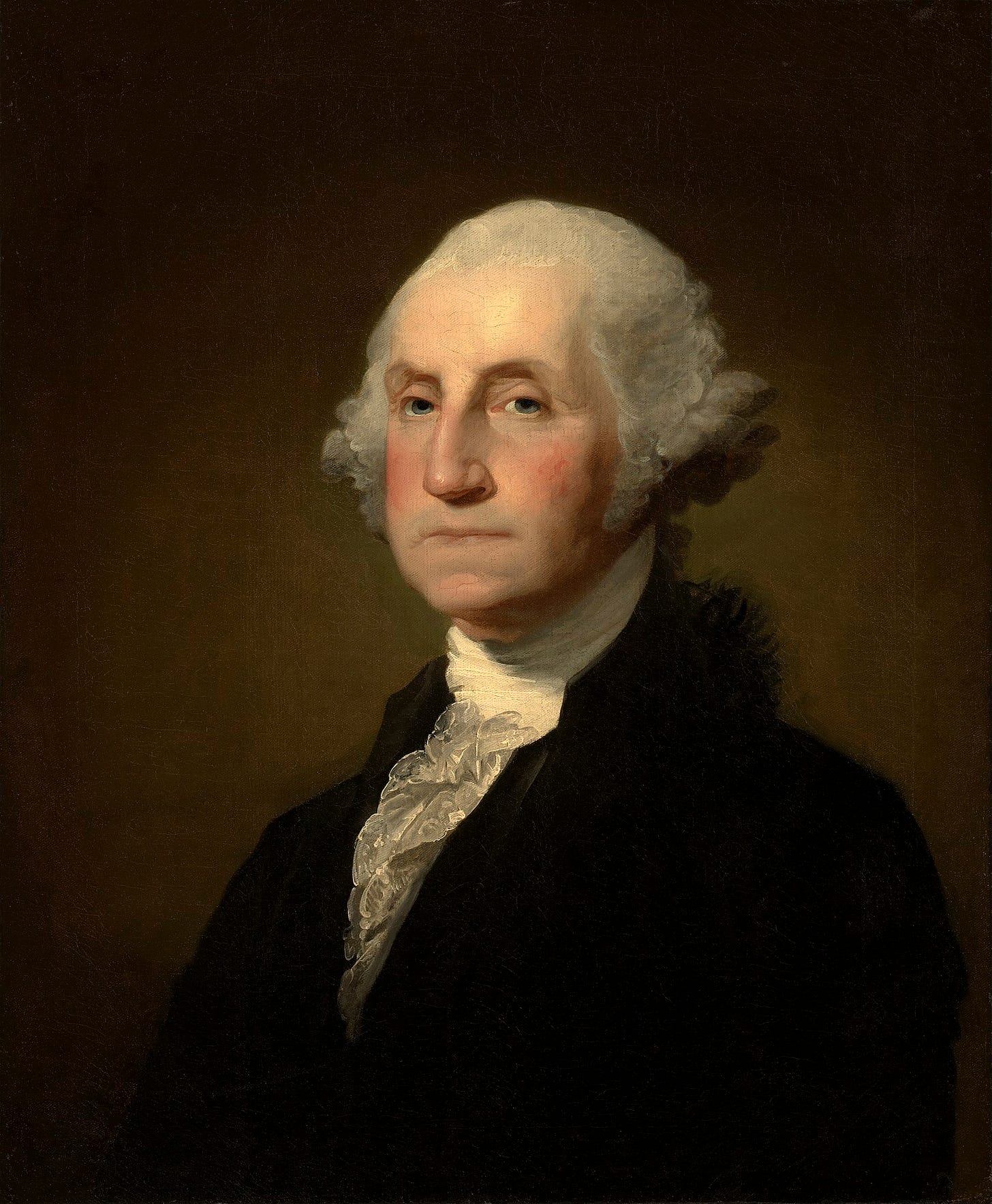Though, in reviewing the incidents of my administration, I am unconscious of intentional error, I am nevertheless too sensible of my defects not to think it probable that I may have committed many errors.
George Washington, Farewell Address
Reading those words, one can almost hear the weariness as well as the humility in the phrases chosen by the Father of our Country. Washington had served in capacities beyond wildest consideration, for much is asked of those who have much talent to give.
On September 19th, 1796, George Washington issued his famous Farewell Address. This was the end of his second term, and Washington was determined to retire for two reasons. Firstly, he did want to die while in office, as this would set the precedent that the position was hereditary. Not that a man of robust health like Washington was plagued by frailty or failing health. But in 1796 Washington as 64 years old, and at the turn of the 18th century life spans were on average 40 years. Secondly, Washington had originally planned to serve for just a single term, yet at the urging of Madison and others, he remained to be the calm hand at the helm as the new nation worked to fulfill its financial obligations to allies who had supported the colonies during the Revolution. Washington also championed the second form of government after the Articles of Confederation were set aside in favor of the US Constitution. The success of this new form of government, never attempted before in known history, was not guaranteed. Washington’s reputation for honor commanded a respect that gave the new nation a confidence to tread where no people had successfully tread before. This also exacted a toll on Washington.
As has been emphasized many times on our Sunday Nights Radio podcasts, Washington’s great assets were his sense of honor, humility and steadfast devotion to those men who served under his command. As a military strategist, he only won two battles where he solely commanded troops, and yet his timing, luck, and nimble ability to adjust to conditions as they arose played into his unlikely success against the largest, best equipped fighting force in the world.
While known for his fierce courage under fire, with bullets gracing by as he kept his troops engaged, the factions and vicious in-fighting of the same men who bound together during the Revolution proved to be an immense challenge. And disappointment as well. These men were not under his command, they were perhaps the most talented people on the American Continent, as all possessed of superior ability. And superior ability breeds superior ambitions. That proved to be hard to tame.
The source of friction came from a rivalry and disparate visions of Alexander Hamilton and Thomas Jefferson. Hamilton favored strong central government which would use debt and a vehicle for investment in industry while Jefferson favored an agrarian economy. Washington wrote to Jefferson:
How unfortunate, and how much is it to be regretted.., that whilst we are encompassed on all sides with avowed enemies and insidious friends, that internal dissentions should be harrowing and tearing our vitals. The last, to me, is the most serious-the most alarming-and the most afflicting of the two. And without more charity for the opinions and acts of one another in Governmental matters. … I believe it will be difficult, if not impracticable, to manage the Reins of Government or to keep the parts of it together: for if, instead of laying our shoulders to the machine after measures are decided on, one pulls this way and another that, before the utility of the thing is fairly tried, it must inevitably be tom asunder- And, in my opinion the fairest prospect of happiness and prosperity that ever was presented to man, will be lost-perhaps for ever!
Washington’s Cabinet and Administrations rife with challenges.
Below are the members of Washington’s Cabinet. Washington and his supporting cabinet members are facing to the left. The gentleman facing to the right in the upper right hand corner is Vice President John Adams.
Treating Washington 12 o’clock, at 2 o’clock is James Madison, at 4 o’clock is Alexander Hamilton, 5 o’clock Henry Knox, 7 o’clock Edmund Randolph, 8 o’clock is John Jay, and at 10 o’clock is Thomas Jefferson.
Washington was the lynch pin for these men. Profound difference arose in the early years as the French Revolution proceeded. America had signed a treaty of defense with France, and Washington and Jefferson both felt bound to support the French in their quest for liberty as the United States had been. But when France declared war on Britain, Washington wisely sought to remain neutral as the United States could not afford a conflict with England, nor could the US win such a conflict from a military perspective. This divided the members of Congress and the Cabinet, as well as souring relations with France.
John Adams, Odd Man Out
John Adams felt under utilized as Vice President, and was not invited to attend the President's cabinet meetings. This was difficult for Adams for he was so critical to the formation of the coalition which pushed the Continental Congress to adopt and approve the Declaration of Independence. He was in many ways, a prime mover for the efforts which galvanized the colonies into a united front that weathered the Revolutionary War. Adams was also someone of immense energy, and to be sidelined was difficult for someone of his drive.
Of his duties as Vice President, Adams stated that his role was “the most insignificant office that ever the invention of man contrived or his imagination conceived."
Warnings from George Washington
Washington sought both Madison’s and Hamilton’s assistance with crafting his farewell speech, but it is to be noted that Hamilton made it clear that Washington was to have final approval, so there is no doubt that the sentiments and observations expressed originated with Washington.
Debt Was A Component of Defense
Washington warned that debt could place the United States in a position of being unable to raise funds for defense when the time would inevitably arise. He also made it clear that debt unfairly burdened future generations with obligations that were not of their own making.
As a very important source of strength and security, cherish public credit. One method of preserving it is, to use it as sparingly as possible; avoiding occasions of expense by cultivating peace, but remembering also that timely disbursements to prepare for danger frequently prevent much greater disbursements to repel it; avoiding likewise the accumulation of debt, not only by shunning occasions of expense, but by vigorous exertions in time of peace to discharge the debts, which unavoidable wars may have occasioned, not ungenerously throwing upon posterity the burthen, which we ourselves ought to bear.
Guard Against Modifications of the Constitution’s Strengths
Washington believed that there was only one way to modify the Constitution, and that was through the process of amendments. Overreach of authority from the various branches was a usurpation of power, and while easy and expedient, such violations would lead to the destruction of the integrity of the system the Constitution created.
If, in the opinion of the people, the distribution or modification of the constitutional powers be in any particular wrong, let it be corrected by an amendment in the way, which the constitution designates. But let there be no change by usurpation; for, though this, in one instance, may be the instrument of good, it is the customary weapon by which free governments are destroyed.
Washington further explained that future generations should be wary of clever innovations with interpretation of the Constitution. Due must be followed as well, as it kept the authority of the rule of law intact.
Towards the preservation of your government, and the permanency of your present happy state, it is requisite, not only that you steadily discountenance irregular oppositions to its acknowledged authority, but also that you resist with care the spirit of innovation upon its principles, however specious the pretexts
More Resources on Washington’s Farewell Address
The Tenth Amendment Centers offers phenomenal insight not only on the history of the formation of our country and the US Constitution, but also insight to how we no longer govern by it’s precepts.










We could use 200 men in Congress with the humility of Washington!